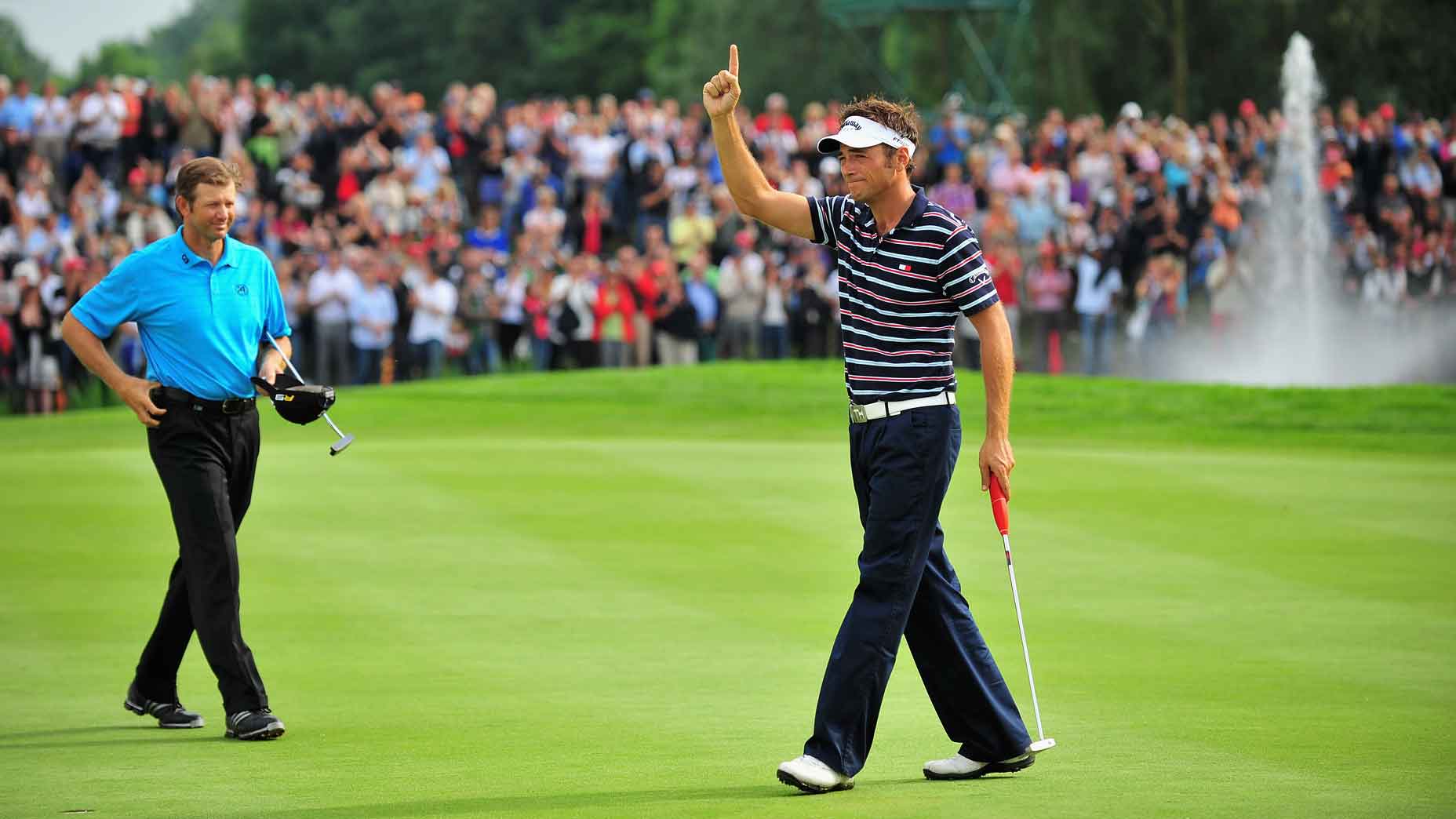When Greg Norman signed on with LIV Golf Investments, a new golf entity backed by the Public Investment Fund which operates on behalf of the Saudi Arabian government, as its CEO and commissioner of the Super Golf League in October, it seemed as if the landscape of men’s professional golf was changing right before our very eyes.
Rumors and speculation have surrounded some of the game’s biggest stars for months, but after controversial comments made by Phil Mickelson, as well as prized targets Dustin Johnson and Bryson DeChambeau backing the PGA Tour, Rory McIlroy dubbed the league that planned to rival the PGA Tour “dead in the water” last week.
From $100 million offers to Donald Trump’s Bedminster and Doral properties being used to host events as soon as this summer, here’s a timeline of the rise (and potential fall) of the Super Golf League.
Professional golf in Saudi Arabia
The first professional golf event in Saudi Arabia — the Saudi International — was held in 2019 as a European Tour event, just months after the death of Washington Post journalist Jamal Khashoggi. Since its debut, the event has been criticized as a targeted attempt by the Saudi government to “sportswash” its controversial human rights record and improve its image. In 2022, the Public Investment Fund, chaired by crown prince Mohammed bin Salman, became the event’s title sponsor.
A handful of big names have made the trip to play over the years, including Johnson, a two-time champion in 2019, 2021. Major champions like Mickelson, DeChambeau and Brooks Koepka have also been paid to play the event. After the 2020 tournament, the Saudi International moved from the European Tour to the Asian Tour schedule for 2021. Over the last year, LIV Golf Investments has committed to invest $300 million in the Asian Tour.
After turning down opportunities to go to the Middle East for many years, I’m excited to go play and see a place in the world I’ve never been. I understand those who are upset or disappointed. You’ll be ok. I’m excited to experience this for the first time.
— Phil Mickelson (@PhilMickelson) December 3, 2019
Because of this, Golfweek learned back in July that the PGA Tour would refuse to allow players to compete in the controversial tournament in 2022. Tour members must obtain a waiver to compete on other circuits and, because the Saudi event is no longer sanctioned by the European Tour, the PGA Tour noted to managers that permission would no longer be granted.
The Tour pivoted in December when it granted permission for 30 of its members—including Mickelson, Johnson and DeChambeau—to play the 2022 Saudi International, held earlier this month at Royal Greens Golf and Country Club in King Abdullah Economic City.
Who’s involved?
That’s the $100 million question. No names have ever been officially announced, but a handful of players have previous ties to golf in Saudi Arabia.
Mickelson’s involvement in a rival, Saudi-backed league dates back to the 2020 Saudi International pro-am, where Lefty reportedly played alongside league representatives.
In July 2020, the Guardian reported that the league had sent formal offer letters worth “hundreds of millions of dollars” to a handful of players including Mickelson, Adam Scott, Henrik Stenson, Justin Rose, Rickie Fowler, Paul Casey and Koepka. Almost a year later on May 4, 2021, a report in the Telegraph stated that multi-million dollar offers, some ranging from $30-50 million, were sent to Mickelson, Johnson, Scott, Koepka, DeChambeau, Fowler and Rose. That same month, player managers and agents met with the league’s backers on the Tuesday night before the 2021 PGA Championship at Kiawah, won by Mickelson.
Earlier this month DeChambeau denied being offered $135 million to join the Super Golf League.
Player and Tour reactions
Rory McIlroy was the first big name to denounce rival leagues with his, “For me, I’m out,” quote in February 2020. A month later he would be echoed by Jon Rahm and Koepka. At that time, the players were all ranked inside the top-three in the world.
In May of 2021 after the news of the $30-50 million offers, McIlroy doubled down, saying, “I don’t see why anyone would be for (the new league).” The PGA Tour — which created a “strategic alliance” with the European Tour to combat any rival leagues — has been steadfast in its stance. In a meeting with players that same month, commissioner Jay Monahan drew a line in the sand with multiple sources telling Golfweek’s Eamon Lynch that leaving the Tour for the new league would result in an immediate suspension from the PGA Tour and likely a lifetime ban.
On top of that, PGA of America CEO Seth Waugh said PGA Tour defectors would be barred from competing in the biennial Ryder Cup against Europe.
“If someone wants to play on a Ryder Cup for the U.S., they’re going to need to be a member of the PGA of America, and they get that membership through being a member of the Tour,” Waugh said last May. “I believe the Europeans feel the same way, and so I don’t know that we can be more clear kind of than that. We don’t see that changing.”
In a direct response to rival golf leagues, the PGA Tour also created the Player Impact Program, a $40 million bonus pool designed to compensate players who drive fan and sponsor engagement. In 2022 the pool increased to $50 million. The Comcast Business Tour Top 10—which bonuses top-performing players at the end of the regular season and before the FedEx Cup playoffs—will double its riches to $20 million. The Tour has also created a new bonus scheme from which most members stand to gain. The Play15 program will give $50,000 to every player who makes at least 15 starts.
Recently Tiger Woods, Collin Morikawa, Justin Thomas, Rahm, McIlroy and more all publicly backed the Tour, with Johnson and DeChambeau following suit after Mickelson’s controversial comments in which he said the Saudis are “scary motherf—–s to get involved with.”
Why Greg Norman?
This isn’t the Shark’s first time wading into the waters of a rival golf league.
Norman, the two-time major champion and World Golf Hall of Famer who won 20 times on the PGA Tour and 14 times on the European Tour, attempted to get the World Golf Tour off the ground in 1994, but was unsuccessful. The two-time British Open champion’s play was rejected by then-Tour commissioner Tim Finchem, who announced the World Golf Championships three years later in 1997.
Golfweek reported in November how the PGA Tour planned to create a series of lucrative, international tournaments that will offer guaranteed money to the world’s best players.
What’s next?
McIlroy asked the question we’re all thinking: “Who’s left? Who’s left to go?”
With the game’s biggest stars all backing the Tour, the SGL has little-to-no momentum on its side and will now have sway mid-tier to aging Tour players, or recruit from the Korn Ferry, Asian and DP World tours.
Initially hoping for a spring of 2022 debut, No Laying Up reported in October that the 12-event league was looking into a few Donald Trump courses including Doral and Bedminster. A report in the Washington Post last week said that “at least two of Trump’s courses in Bedminster, N.J., and Doral, Fla., could be named as sites for the nascent tour, according to the people familiar with the talks, who like others requested anonymity to discuss internal deliberations. Officials from LIV Golf Investments, the apparatus funded by the Saudis to host the tour, have held conversations with the Trump Organization, these people said.”
While McIlroy claimed the league to be “dead in the water,” that might be a bit premature. LIV Golf has put together an array of industry executives, as well as a longtime PGA Tour rules official to help get the league off the ground. With seemingly infinite funds at their disposal, there may still be more to come.









